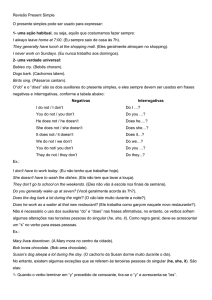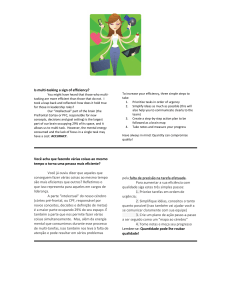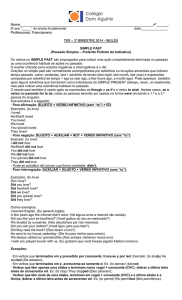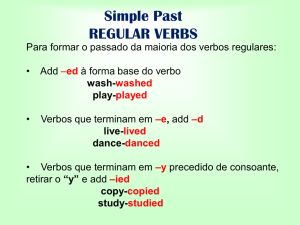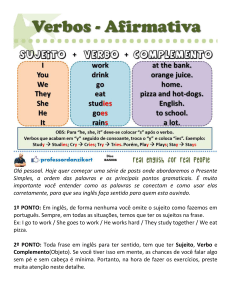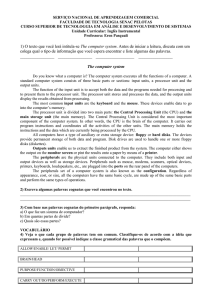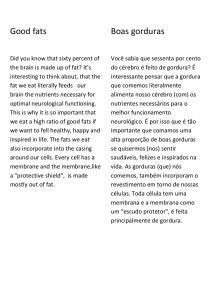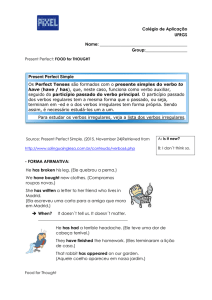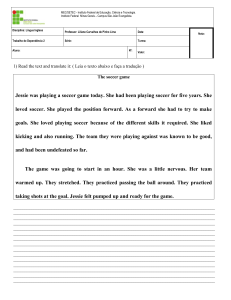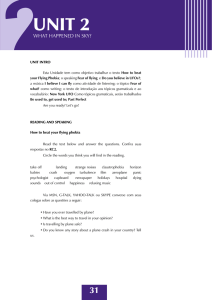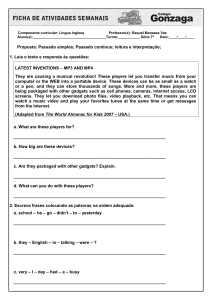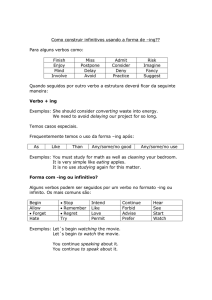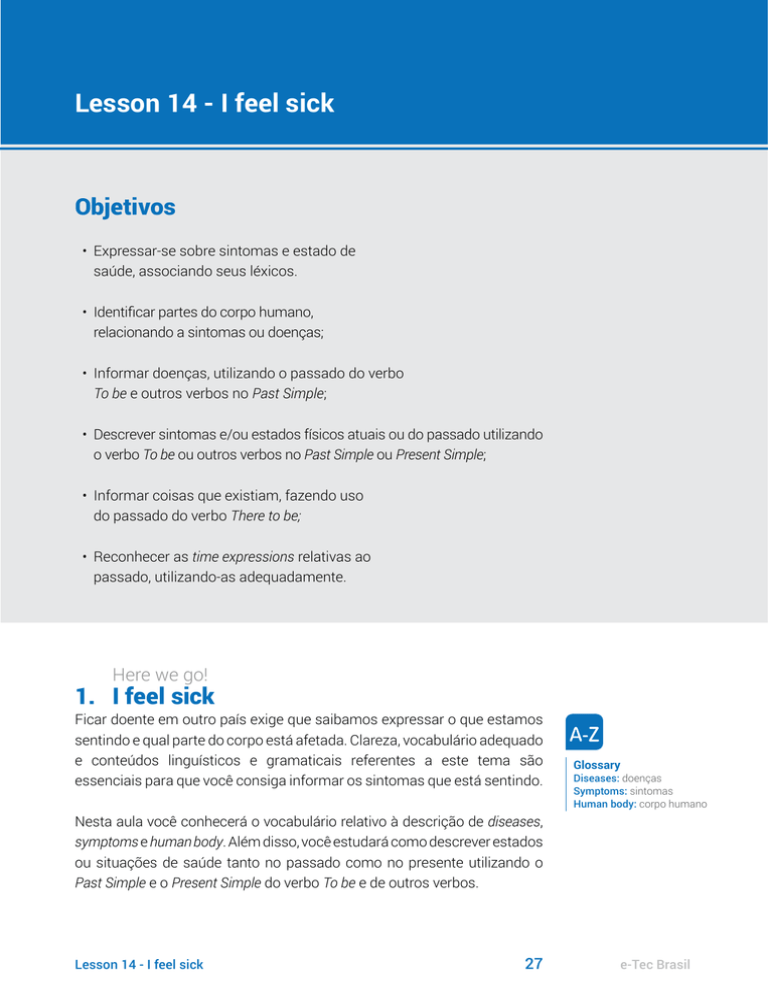
Lesson 14 - I feel sick
Objetivos
• Expressar-se sobre sintomas e estado de
saúde, associando seus léxicos.
• Identificar partes do corpo humano,
relacionando a sintomas ou doenças;
• Informar doenças, utilizando o passado do verbo
To be e outros verbos no Past Simple;
• Descrever sintomas e/ou estados físicos atuais ou do passado utilizando
o verbo To be ou outros verbos no Past Simple ou Present Simple;
• Informar coisas que existiam, fazendo uso
do passado do verbo There to be;
• Reconhecer as time expressions relativas ao
passado, utilizando-as adequadamente.
Here we go!
1. I feel sick
Ficar doente em outro país exige que saibamos expressar o que estamos
sentindo e qual parte do corpo está afetada. Clareza, vocabulário adequado
e conteúdos linguísticos e gramaticais referentes a este tema são
essenciais para que você consiga informar os sintomas que está sentindo.
Glossary
Diseases: doenças
Symptoms: sintomas
Human body: corpo humano
Nesta aula você conhecerá o vocabulário relativo à descrição de diseases,
symptoms e human body. Além disso, você estudará como descrever estados
ou situações de saúde tanto no passado como no presente utilizando o
Past Simple e o Present Simple do verbo To be e de outros verbos.
Lesson 14 - I feel sick
27
e-Tec Brasil
Warming up
2. I felt very sick two years ago...
Christine está com um forte resfriado e Rosa, para ajudar a roommate, leva
um prato de sopa. Veja a conversa entre elas:
Rosa: Christine? It’s Rosa, I I brought some soup .
Christine: Come in.
Rosa: You look very messed up.
Integrated media
Acesse a mídia I have
the flu e veja a conversa
entre Christine e Rosa.
Christine: I’m sick. I have the flu.
Rosa: How do you feel? Are you taking any medicine?
Christine: I have a fever, cough and a headache, but I’m getting better, I was worse.
Rosa: And are you okay?
Christine: Okay? I’m sick, don’t you know already?
Rosa: I mean, the thing with Dube.
Glossary
Brought: trouxe
Miserable: abatido
Fever: febre
Cough: tosse
Headache: dor de cabeça
Worse: pior
Sick: doente
Guilty about: culpado por
Get it out of your
chest: desabafar
Christine: I don’t know, Rosa. I gotta travel to New York for that job interview in a
few days.
Rosa: And that’s great, Chris. You don’t need to feel guilty for anything.
Christine: I think you’re right. It’s just… I’m very sick right now, I shouldn’t be thinking
about these sad things.
Rosa: No, you should get it off your chest.
No diálogo que você acompanhou, Christine diz à Rosa que está gripada,
com febre, tosse e dor de cabeça. No tópico a seguir apresentamos outros
sintomas e algumas doenças.
1ª ed. rev. e atual.
28
English
3. Getting the hang of it
3.1 States and Symptoms
Audio
Conhecer o vocabulário sobre doenças auxilia muito no momento de
definir o tratamento. Para tanto, é sempre importante saber descrever o
que se está sentindo. Ao indicar os sintomas, no idioma inglês, utilizamos
os verbos To be ou To feel, ou seja, você pode dizer “I am...” ou “I feel...”, que
corresponde a “eu estou...” e “eu sinto...”. Observe a tabela a seguir:
Verb
To be
To feel
tired
I am tired.
I feel tired.
sick
I am sick.
I feel sick.
dizzy
I am dizzy.
I feel dizzy.
hot
I am hot.
I feel hot.
I have a cold.
flu
I have the flu.
pneumonia
I have pneumonia.
cough
I have a very bad cough.
fever
I have a fever.
diarrhea
I have diarrhea.
runny nose
I have a runny nose.
stuffy nose
I have a stuffy nose.
headache
I have a headache.
stomachache
I have a stomachache.
backache
I have a backache.
toothache
I have a toothache.
earache
I have an earache.
Lesson 14 - I feel sick
Acesse a mídia Diseases
and definitions para praticar
um pouco da sua leitura.
Glossary
Tired: cansado
Sick: doente
Dizzy: tonto
Hot: quente
A partir dos sintomas é possível identificar as doenças que uma pessoa
pode contrair. Para mencioná-los utilizamos o verbo Have, assim, para
dizer que estamos gripados dizemos “I have the flu”. Para mencionar ou se
referir a terceira pessoa do singular, utiliza-se has. Veja a tabela a seguir:
cold
Getting on
Mind the gap
A palavra hot pode ser
interpretada de uma outra
forma, dependendo do contexto
de uso. Você pode dizer que
está hot por estar com uma
sensação de febre, ou por estar
se exercitando - e neste caso o
calor não é associado à doença.
Glossary
Cold: resfriado
Flu: gripe
Pneumonia: pneumonia
Cough: tosse
Fever: febre
Diarrhea: diarreia
Runny nose: nariz escorrendo
Stuffy nose: nariz entupido
Headache: dor de cabeça
Stomachache: dor de estômago
Backache: dor nas costas
Toothache: dor de dente
Earache: dor de ouvido
29
e-Tec Brasil
Algumas doenças são mais comuns do que outras. Veja a seguir algumas
delas:
Audio
Glossary
Chickenpox: catapora
Measles: sarampo
Mumps: caxumba
Rubella: rubéola
Indigestion/upset stomach:
indigestão/mal estar estomacal
Insomnia: insomnia
chickenpox
I have chickenpox.
measles
I have measles.
mumps
I have the mumps.
rubella
I have rubella.
indigestion/upset stomach
insomnia
Learning activity
I have indigestion.
I have an upset stomach.
I have insomnia.
Assimilar este vocabulário é importante caso seja necessário aplicá-lo em
uma situação de doença. Com isso, pratique este conteúdo com a Activity
Complaining.
Complaining
Ainda para mencionar algum sintoma ou doença, é necessário conhecer
como se denominam as partes do corpo em língua inglesa. Esse é o
conteúdo que será apresentado a seguir.
1ª ed. rev. e atual.
30
English
3.2 Parts of the body
Além de sabermos expressar o mal estar que estamos sentindo, é
fundamental que saibamos o nome da parte do corpo afetada. Veja a
seguir o human body and its parts.
HEAD
EYE
MOUTH
NECK
EAR
Glossary
SHOULDER
CHEST
ARM
STOMACH
ELBOW
WRIST
FINGERS
HAND
LEG
KNEE
FOOT
Audio
Eye: olho
Mouth: boca
Shoulder: ombro
Chest: peito
Arm: braço
Wrist: pulso
Fingers: dedos
Leg: perna
Foot: pé
Head: cabeça
Ear: ouvido/orelha
Neck: pescoço
Stomach: estômago
Elbow: cotovelo
Hand: mão
Knee: joelho
Toes: dedos (dos pés)
TOES
Além de falar da parte do corpo afetada, quando falamos em doença é
provável que também falemos em dor. A palavra dor em inglês pode ser
mencionada de várias formas. Nesta aula, você estudará hurt, pain e injury.
Hurt pode ser entendido como doer, machucar ou magoar, dependendo
do contexto. Pode referir-se tanto a dor física quanto emocional. Observe
os exemplos:
My foot hurts.
I was hurt by a cat.
Jeff deeply hurt Emily with his attitudes.
Hurt também pode ser usado como adjetivo, com sentido de machucado.
Veja os exemplos a seguir:
Lesson 14 - I feel sick
31
e-Tec Brasil
Are you hurt?
There is a hurt animal in front of the house.
Audio
Também podemos usar o substantivo pain para indicar dor ou sofrimento.
Acompanhe os exemplos:
I have abdominal pain.
Are you in pain?
All her physical pains were caused by the accident.
Glossary
Physical harm: mal físico
Damage: dano
Wound: ferida, ferimento
Lesion: lesão
Injury: ferimento
A palavra injury refere-se a um physical harm or damage. Wound e lesion
também são substantivos e podem ser usados como sinônimos de injury.
She had a severe injury after the fight.
She had a deep wound on her arm and lost some blood.
Exercite seu conhecimento realizando a Activity Parts of the body.
Learning activity
Parts of the body
1ª ed. rev. e atual.
Para falar sobre seu histórico de doenças é preciso utilizar o Past Simple.
Este conteúdo será abordado no tópico a seguir.
32
English
3.3 Past simple - Verb To be
Em uma conversa com Carly, Rosa conta sobre um dia em que ficou
doente. Acompanhe:
Audio
Rosa: Gee, Christine is really sick. The last time I felt sick was two years ago.
Carly: What happened?
Rosa: Well, I went to school. I had a headache. During class I felt dizzy.
Carly: Really? Why didn’t you go home?
Rosa: Because I was too fragile to walk home. Everything happened very fast. I felt
dizzy and suddenly I passed out.
Carly: Wow! That was terrible! Why were you so bad?
Rosa: Because I ate a peanut cake that day. That’s when I found out I’m allergic to
peanuts.
No diálogo acima, Rosa utiliza o Past Simple do verb To be para falar de
coisas que aconteceram e terminaram no passado. Veja na tabela a
conjugação do verbo To be:
I
was
It
was
You
were
We
were
He
was
You
were
She
was
They
were
Lesson 14 - I feel sick
33
e-Tec Brasil
Veja como Rosa e Christine utilizam o verbo To be no passado em sua
conversa:
Audio
The last time I felt sick was two years ago.
I was too fragile to walk home.
Why were you so bad?
Para construir frases negativas no passado do to be é necessário utilizar a
partícula de negação not. Você pode escrever por extenso (was not) ou de
forma contraída (wasn’t), conforme os exemplos que seguem:
I was not very excited about Dube’s performance.
I wasn’t at home yesterday. I was at the pub.
We were not at the shopping mall, we were at the supermarket.
We weren’t happy with the news.
As frases interrogativas e as short answers funcionam como no presente,
com o verbo posicionado no início da pergunta. Observe:
Question
Short answer
Was Christine angry with Dube?
Yes, she was.
Were Carly and Rosa at home?
Yes, they were.
Were you in New York?
No, I wasn’t.
Were they at the pub?
No, they weren’t.
Quando houver uma wh-question, é o pronome interrogativo que inicia a
pergunta. Observe:
1ª ed. rev. e atual.
34
What was the color of Billy’s jacket yesterday?
It was green.
Where were your grandparents last night?
They were at a restaurant.
English
O verbo To be também pode ser usado para dizer quando ou onde você
nasceu. Para isso, você usa o verbo to be born e coloca o be no passado. Veja:
Audio
I was born in 1993.
Billy was born in a noble family.
Rosa’s parents were born in the countryside of Rio de Janeiro.
Billy and Rosa were born in different countries.
Depois de estudar o verbo To be no passado, acompanhe o tópico a seguir
e veja a estrutura das formas afirmativa, negativa e interrogativa do verbo
There to be.
3.4 Past Simple - Verb There to be
Depois de estudar o verbo To be no passado, fica mais fácil utilizar o There
to be. Lembre que este verbo foi estudado na Lesson 12, e significa haver e
existir. Acompanhe os exemplos:
There was something wrong with Dube and Christine.
There were many medicines on Christine’s bedside table.
Você pode utilizar o There To Be para questions e short answers. Veja:
Question
Short answer
Was there something wrong with Dube and Christine?
Yes, there was.
Was there a message from Dube
on Christine’s cell phone?
No, there wasn’t
Were there many medicines on
Christine’s bedside table?
Yes, there were.
Were there many people at the pub?
No, there weren’t.
A Activity Health problems é uma boa oportunidade para você fixar a forma
dos verbos no passado simples. Realize a atividade e não deixe de exercitar!
Lesson 14 - I feel sick
35
Learning activity
Health problems
e-Tec Brasil
Neste tópico você estudou o verbo There To be, e a seguir verá como
funciona a estrutura de outros verbos no passado.
Audio
3.5 Past simple - Regular and Irregular verbs
Os regular verbs são assim chamados por serem acrescidos da terminação
-ed. Apresentamos na tabela a seguir os verbos relacionados ao tema
desta aula.
Glossary
Sneeze: espirrar
Ache: doer
Twist: torcer
Sprain: distender
Faint: desmaiar
Present form
Past form
Example
sneeze
sneezed
Billy sneezed over the food.
ache
ached
My left shoulder ached last night.
twist
twisted
I twisted my ankle.
sprain
sprained
She has a sprained ankle.
faint
fainted
She fainted because of the heat.
Já os irregular verbs são verbos que assumem formas bastante diferentes
quando conjugados no passado. Eles não têm uma padronização. Veja
alguns exemplos:
Glossary
Have: ter
Hurt: doer/machucar
Bleed: sangrar
Feel: sentir
Present form
Past form
Example
have
had
I had a headache.
hurt
hurt
These sandals hurt my feet.
bleed
bled
She bled after the ball hit her nose.
feel
felt
I felt dizzy.
Existem verbos que aceitam tanto a conjugação na forma regular quanto
irregular. Veja na tabela a seguir alguns deles:
Glossary
Burn: queimar
Dream: sonhar
Learn: aprender
Smell: cheirar
1ª ed. rev. e atual.
36
Present form
Past form
Example
burn
burned/burnt
I burnt my tongue with hot tea.
dream
dreamed/dreamt
I dreamed about you last night.
learn
learned/learnt
We learned new things last class.
smell
smelled/smelt
The food smelt good.
English
Pratique este vocabulário realizando as Activities My photo album e What’s
the past of...? e para consolidar seu conhecimento.
Learning activity
No tópico a seguir, veja a pronúncia de Was e Were no inglês americano e
britânico.
3.6 Time expressions
Quando usamos o past simple é muito comum que situemos em que
momento do passado determinada ação aconteceu, fazendo uso das time
expressions.
In the hospital
What’s the past of...?
Audio
No diálogo que você acompanhou, Rosa usa uma dessas expressões para
falar sobre sua saúde:
Rosa: Gee, Christine is really sick. The last time I felt sick was two years ago.
Veja a seguir outras time expressions:
Yesterday
Last hour
A year ago
The day before yesterday
Last semester
Two hours ago
Last night
Last Tuesday
A week ago
Last year
The last time
Earlier today
Last month
The first time
Earlier this week
Last week
A month ago
Glossary
As time expressions podem ser colocadas tanto no início quanto no final da
sentença, como você pode perceber nos seguintes exemplos.
Yesterday I went to a restaurant with my boyfriend.
Yesterday: ontem
The day before yesterday:
anteontem
Last night: noite passada
Last year: ano passado
Last month: mês passado
Last week: semana passada
Last hour: última hora
Last semester: semestre passado
Last tuesday: terça
passada/última terça
The last time: a última vez
The first time: a primeira vez
A month ago: um mês atrás
A year ago: um ano atrás
Two hours ago: duas horas atrás
A week ago: uma semana atrás
Earlier today: hoje mais cedo
Earlier this week: no
início dessa semana
I visited my friends the day before yesterday.
Last year I traveled to Hawaii.
I had lunch two hours ago.
Earlier today I saw Jim.
Lesson 14 - I feel sick
37
e-Tec Brasil
Audio
Pratique este conteúdo com a Activity Christine’s often sick. Depois de
exercitar as time expressions, você estudará o Past Simple do verb To be.
Acompanhe o tópico a seguir.
Out loud
3.7 Was and were
Learning activity
Christine’s often sick
Was e Were possuem uma diferença na pronúncia de acordo com a origem
do falante. No inglês americano costuma-se marcar mais a letra “a” de
Was e o “r” de Were. Já no inglês britânico, “as” de Was é mais sutil. A letra
“r” de Were também não é pronunciada. Nos exemplos abaixo você ouvirá
o contraste da pronúncia do inglês americano e britânico.
AmE
BrE
was
was
I was sick.
I was sick.
AmE
BrE
were
were
We were sick.
We were sick.
A repetição dessas palavras é importante tanto para melhorar o seu
speaking quanto o seu listening, por isso pratique.
1ª ed. rev. e atual.
38
English
Catching a glimpse 4. Talking about diseases
Some diseases are certainly more common than we would like them to be,
for example, pneumonia. It often starts during or after a severe respiratory
infection, such as a flu or a cold. Many symptoms may appear, including:
• Cough, often producing mucus from the lungs. It may be tinged with blood.
• Fever, especially in young adults.
• Shaking and chills, one time only or many times.
• Fast breathing, the feeling of being short of breath.
• Chest pain, especially when coughing or breathing in.
• Fast heartbeat.
• Nausea, vomiting, diarrhea.
Everyone knows that the best thing to do is preventing diseases. Here are
some strategic tips for you to follow:
•
•
•
•
Hand washing is mandatory!
Never touch your eyes, nose or mouth without washing your hands!
Don’t share food or other things that go in the mouth (straws, for example)!
Cover your mouth with a tissue when you cough or sneeze. If you
don’t have a tissue, do it inside your elbows, and not in your hands!
• Get proper rest and good nutrition to improve resistance and immunity.
Audio
Glossary
To tinge: past form:
Tinged : tingido
Shaking: tremores
Chills: arrepios
To breathe - breath - breathing:
respirar - respiro - respiração
Breathing in: inspirando
Breathing out: expirando
Heartbeat: batida do coração
Mandatory: obrigatório
Straw: canudo
Tissue: lenço de papel
Rest: descanso
But, if something comes up, and you are not feeling very well, make an
appointment with the doctor, ask for help or go to the hospital. And don’t
self-medicate.
Lesson 14 - I feel sick
39
e-Tec Brasil
5. That’s a wrap!
Christine está muito gripada e precisa de cuidados. A partir dessa situação
você conheceu algumas palavras relacionadas a estados de saúde e
sintomas. Estudou o nome de algumas doenças bem como o vocabulário
referente a partes do corpo. Conheceu algumas time expressions que
possibilitam falar sobre quando algo aconteceu. Através do uso do Past
Simple do verbo To Be é possível falar sobre histórico médico. A partir desse conteúdo é possível que você já tenha condições de falar
sobre alguma doença ou mal estar que esteja sentindo ou que tenha
sentido no passado.
1ª ed. rev. e atual.
40
English

